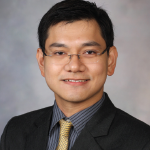A: Spend time pursuing endeavors you find interesting and fulfilling, even if they don’t seem immediately useful. You never know when they’ll become relevant in unexpected ways.
 Patompong Ungprasert, MD, MS
Patompong Ungprasert, MD, MS
Assistant Professor of Medicine, Department of Medicine, Siriraj Hospital, Mahidol University, Bangkok, Thailand
Background: Dr. Ungprasert trained in internal medicine at Bassett Medical Center in Cooperstown, N.Y., and recently completed his rheumatology fellowship at the Mayo Clinic in Rochester, Minn. He has returned to Thailand with hopes of establishing an epidemiology surveillance program focused on rheumatic disease in developing countries.
“The resources available in developing countries like Thailand are certainly limited compared with the United States,” he says. “I have to adjust my practice to accommodate what my patients [and my hospital] can afford.”
Under the watchful eye of Mayo Clinic rheumatologist Eric Matteson, MD, Dr. Ungprasert completed his master’s degree in translational science. His current research is devoted to investigating the clinical characteristics and epidemiology of sarcoidosis.
“My studies have demonstrated that patients with sarcoidosis have a higher risk of developing several comorbidities, such as coronary artery disease, stroke, venous thromboembolism, infection, osteoporotic fracture,” he says. “Therefore, comprehensive medical care is vital for these patients.”
In collaboration with epidemiologists, data his team compiled were important in assessing the risk of various forms of connective tissue-related lung disease among first responders to the Sept. 11 terror attacks in New York City.
‘The resources available in developing countries like Thailand are certainly limited compared with the United States.’ —Dr. Ungprasert
Q: What does it mean to be recognized by your peers as a distinguished fellow?
A: I’d like to acknowledge the guidance and support from my program, the Mayo Clinic and my mentors, Drs. Matteson, Warrington, Mason and Ernste. I’m so grateful for the opportunity to pursue further training in epidemiology and biostatistics, and the dedicated, protected time for research. The recognition from the ACR reflects how excellent the [Mayo] program is.
Q: What’s the most fulfilling part of your fellowship training/path to a career in rheumatology?
A: Besides the long-term trust and relationships I’ve developed with my patients, research is also a vital part of my training and future career. It’s so rewarding for me to contribute to the field of sarcoidosis by fulfilling the knowledge gap. It’s been more than 30 years since the last population-based epidemiologic study of sarcoidosis was published.
Q: What advice do you have for the next generation of rheumatology fellows?



